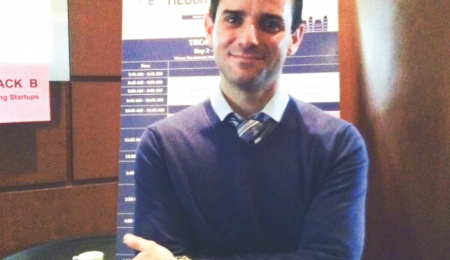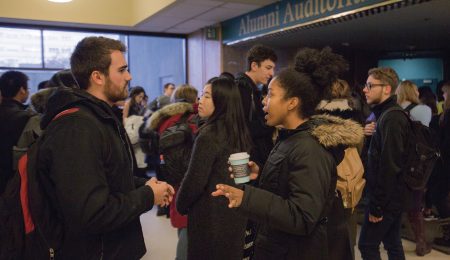Circulating petition seeks roundtable with stakeholders, hiring of more staff, increased training for professors
Content warning: Mental health, suicide
In the wake of four University of Ottawa student deaths in the past eight months, students are pushing the administration to implement concrete changes to its mental health services.
A group of five students is leading the mobilization, starting a quickly growing Facebook group called U of O Collective 4 Mental Health and a petition to the university listing five recommendations for improving mental health services on campus, approaching 3,000 signatures at publication time.
One of those students is Maxime Lê, who originally launched the petition back in 2017 after a student death by suicide was reported on campus. Lê says the petition led to the university hiring two new counsellors, but when he received an emailed statement to students on Friday with notice of a student death, he decided to jump back into action.
“It was that copy-paste, cookie-cutter email sent out that pushed (me) over the edge,” said Lê, who is a graduate student in communications. “It felt like the university treated this death as simply another statistic.”
“It’s a slap in the face,” said third-year political science and communications student Laura O’Connor. “There’s no acknowledgement of the inaccessibility of the resources they’re giving us.”
The first recommendation in the petition is a roundtable discussion with stakeholders, which would include the administration, mental health services directorate, the University of Ottawa Students’ Union (UOSU), representatives from the provincial and municipal governments, and students and community members.
“It allows people from the administration to tell their side of the story and then hear the realities that students face on the ground,” said Le. “We want to work together to help students have better access to mental health services.”
The second recommendation asks the university to hire “more trained and qualified frontline personnel,” including mental health specialists, psychologists, and psychiatrists.
Second-year criminology student Catherine MacIsaac said the goal is to cut down potential wait times students can face when accessing counselling, something she has personally experienced.
MacIsaac, who is diagnosed with an anxiety disorder, said she attempted to meet with a counsellor last year but was turned away and told to return the following week.
“If someone comes into your office and your whole purpose is to help them with their mental health and they’re clearly in crisis, I think it’s messed up to send them home,” said MacIsaac. “It’s the theme that runs through the mental health services at the U of O … we’re working out of heartbreak and frustration.”
Nickolas Eburne, a second-year civil law student, said the group has heard from students who have reported waiting months to meet with a counsellor.
“There needs to be more funding for mental health services because it’s just not enough right now,” said Eburne.
The third recommendation in the petition seeks an increase in training for staff and professors on mental health, with an emphasis on showing flexibility and sympathy if academic performance suffers when students face mental health issues.
O’Connor highlighted the experience of one of her friends, who she said had her mental health issues disclosed in front of a class when she had to leave early for a counselling appointment.
“Professors need to get used to providing accommodations, understanding the stress that might motivate someone to ask for an extension,” said O’Connor.
She added that the training should be trauma-informed and take an intersectional approach, addressing the unique challenges the LGBTQ+ community and Black, Indigenous, people of colour can face.
The fourth recommendation asks the university to implement a “clear pathway” to access external and internal mental health services, along with an efficient referral system, while the final recommendation seeks dedicated mental health fee coverage in the UOSU’s insurance policy to alleviate the costs of prescriptions and private counselling sessions.
Third-year political science and communications student Angela Toubis said that when she needed help she was referred by the university to an external program that charged $200 per hour.
“That’s what they called subsidized, which was pretty ridiculous considering I’m a student,” said Toubis. “It was really disheartening.”
Michel Guilbeault, who helps oversee the U of O’s mental health system as associate vice-president of student services, said the university recognizes there is work to be done on improving the mental health supports offered to students.
“One death is one too many on this campus,” said Guilbeault, adding that mental services saw an increase in demand this September.
According to Guilbeault, the administration hired eight new counsellors at the start of the semester after students voted to increase mental health funding through the UOSU last academic year. SASS is also open three nights a week now, along with Saturdays.
Guilbeault said students in distress can see a counsellor on the same day for an assessment to determine their next steps. For the following appointments, Guilbeault said students can expect to wait “no more than two weeks, but it all depends on the nature of their needs.”
UOSU advocacy commissioner Sam Schroeder said the union “agrees with the spirit of the petition” and has “been working hard with the university to ensure that mental health services are accessible to students.”
“We need to focus on better communicating some of the areas in which we have been able to make strides,” Schroeder said in a statement to the Fulcrum on Wednesday. He highlighted the recent funding boos to SASS and a program the UOSU has invested in called Empower Me, free for students who have not opted-out of the union’s health plan.
Empower Me offers students counselling online, on the phone, or in person, and the wait times are “generally under 48 hours.”
“We’re supportive of having a round table with other stakeholders to ensure that we are both providing and communicating the proper services to students,” said Schroeder.
“We need to do a better job of awareness of services on campus, that’s been a focus for the past two years and clearly we have not done enough,” said Guilbeault. “There’s a commitment on behalf of the university, on behalf of myself personally, to work with students.”
“We want to make the world, the province, and Canada know that the U of O is a champion for mental health,” said Lê. “But we can’t do that if people are being left behind, people feel abandoned, and people are dying.”
Editor’s Note (Dec. 11, 1:10 p.m.): Updated to include comment from the UOSU.
A non-comprehensive list of local mental health resources appears below…
On campus…
- University of Ottawa Health Services (UOHS), 100 Marie-Curie Private
- Offers counselling, psychiatric services, individual, couple or family therapy, access to psycho-educational groups and referrals to specialists off-campus
- Student Academic Success Service (SASS), 100 Marie-Curie Private
- Offers individual counselling, peer-counselling, workshops, online therapy and group counselling using new stepped model; referrals
- Faculty mentoring centres (locations differ by faculty)
- Specialized mentoring services catered to the needs of students in each faculty
Off campus…
- Mental health hotlines…
- Drugs and Alcohol Helpline: 1-866-531-2600
- Fem’aide: 1-877-336-2433
- Good2Talk: 1-866-925-5454
- Kids Help Phone: 1-800-668-6668 or text CONNECT to 686868
- Mental Health Crisis Line: 613-722-6914
- Distress Centre of Ottawa and Region: (613) 238-3311
- Ottawa Rape Crisis Centre: 613-562-2333
- Tel-Aide Outaouais: 613-741-6433
- Trans Life Line: 1-877-330-6366
- Walk-in counselling clinics (six Ottawa locations)…
- Somerset West Community Health Centre (55 Eccles Street)
- South-East Ottawa Community Health Centre (1355 Bank Street)
- Family Services Ottawa (312 Parkdale Avenue)
- Jewish Family Services of Ottawa (300-2255 Carling Avenue)
- Ottawa Community Immigrant Services Organization(959 Wellington St. W)
- CFS/SFC Ottawa (310 Olmstead Road)
- Community health and resource centres (13 in Ottawa)
- Carlington Community Health Centre (900 Merivale Road)
- Eastern Ottawa Resource Centre (215-1980 Ogilvie Road)
- Nepean, Rideau and Osgoode Community Resource Centre (1547 Merivale Road, Unit 240)
- Rideau-Rockcliffe Community Health Centre (225 Donald Street)
- Sandy Hill Community Health Centre (221 Nelson Street)
- South East Ottawa Community Health Centre (1355 Bank Street)
- Western Ottawa Community Resource Centre (2 MacNeil Court)
- Centretown Community Health Centre (420 Cooper Street)
- Lowertown Community Resource Centre (40 Cobourg Street)
- Orleans-Cumberland Community Health Centre (240 Centrum Boulevard)
- Pinecrest-Queensway Community Health Centre(1365 Richmond Road)
- Somerset West Community Health Centre (55 Eccles Street)
- Vanier Community Service Centre (270 Marier Avenue)





